'Death To Khamenei' Rings Out From Loudspeakers In Iran Bazaar
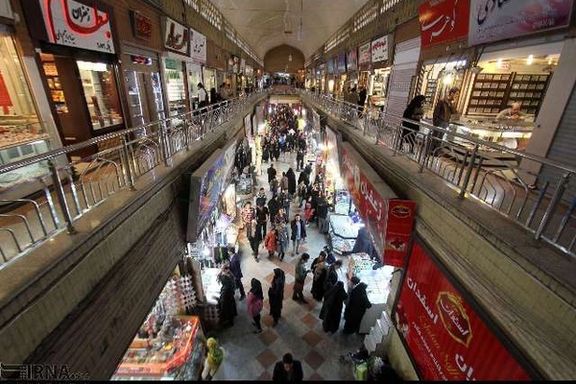
A recorded message against Iran’s Supreme Leader Ali Khamenei was broadcast on the public announcement system in Mashhad’s bazaar, videos in social media show.

A recorded message against Iran’s Supreme Leader Ali Khamenei was broadcast on the public announcement system in Mashhad’s bazaar, videos in social media show.
Hossein Davari, governor of Iran’s second largest city and an important religious center, said that a recording on a USB device “was broadcast for a few seconds” in one part of the bazaar on Wednesday. He did not explain how the recording has reached the PA system.
People present in the bazaar have said that the PA system was hacked and for an extended time anti-Khamenei and anti-Khomeini messages were being broadcast.
In the videos loud voices are heard chanting “Death to Khamenei” and “Khomeini be damned”. Friday is the 43rd anniversary of Iran’s 1979 revolution led by Ayatollah Ruhollah Khomeini, a conservative cleric who established the Islamic Republic.
In repeated mass protests since 2017, demonstrators often chanted “Death to Khamenei” and “Death to the dictator”.
Hackers had recently penetrated the government-controlled state television, interrupting regular programming had broadcasting anti-regime messages. A group calling itself ‘Edalat-e Ali’, or ‘Ali’s Justice’ claimed responsibility. The hackers’ group had also penetrated Iran’s prison system last year and recently, accessing files and CCTV footage.
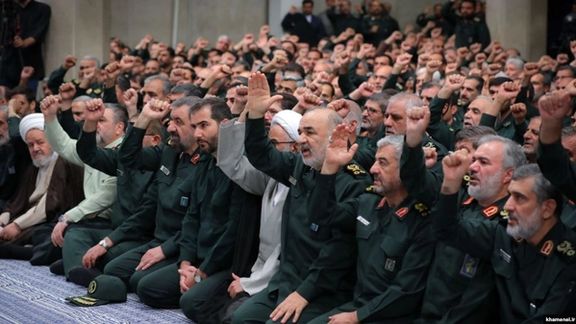
Iran’s Revolutionary Guard (IRGC) will get 20 trillion rials ($80 million) worth of crude oil to finish construction projects for the country’s prayer grounds.
The spokesman of the parliament's budget review committee, Rahim Zar’e, said on Wednesday that the barter has been approved by the committee.
IRGC’s Khatam-al Anbiya Construction Headquarters, which is the engineering arm of the IRGC and one of Iran's largest contractors in industrial and development projects, is set to allocate half of the amount to complete the construction of Grand Mosalla mosque of Tehran while the other half will be spent on similar projects across the country.
The Grand Mosalla (literally meaning prayer grounds or mosque) is a huge patch of land in Tehran that was proposed in 1982 to replace Tehran University as a location for the weekly Friday congregation. Its construction began in 1990 by the IRGC but the complex has not been completed and has largely served as a venue for exhibitions.
The administration of President Ebrahim Raisi is giving a lot of projects to different sections of the IRGC in return for crude oil that Tehran cannot sell due to sanctions, including a $3 billion project for rice production.
Involvement of the IRGC in business began in earnest two decades ago and has become a highly controversial issue in the country. Former president Hassan Rouhani in 2017 publicly criticized the practice and met a quick reaction by hardliners. He has to retract his statements at the time.
Iran has expanded barter to circumvent United States ‘maximum pressure’ sanctions, which threaten punitive action against any third party buying Iranian oil or dealing with Iran’s financial sector. Bartering oil for imports of animal feed and agricultural products has proved particularly viable.
The government has announced that 4.5 billion euros worth of crude oil will be put at the disposal of the armed forces to sell. This means the lion’s share will go to the IRGC, which must find middlemen and illicit ways to export the oil, giving rise to corruption.
Tehran’s city council has also announced its intention to hand over major projects to the Revolutionary Guard, despite serious allegation of large-scale corruption during the mayorship of a former IRGC general Mohammad Bagher Ghalibaf (2005-2017). He is now speaker of parliament
The same scenario happened during the administration of Mahmoud Ahmadinejad in the early 2010s, when for example the police was given oil to sell to provide for its needs. In the end it came to light that nearly $200 million in 2012 was never returned to the country.
A businessman, Babak Zanjani, who is now in jail with the death penalty hanging over his head, was a middleman selling oil during international sanctions also in the early 2010s. He failed to pay back at least $2.7 billion. His accomplices in the government were never identified. It would have not been easy for him to embezzle such a large amount of money without insider support.
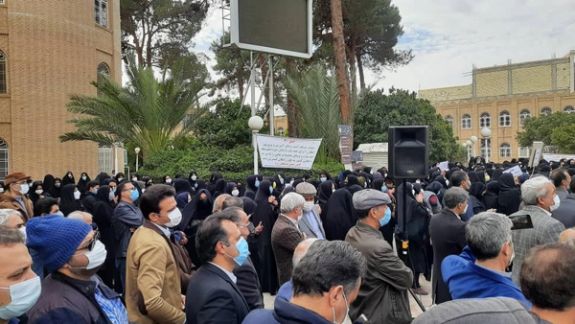
Iran’s education ministry has issued warnings to intimidate teachers and prevent them from participating in protests held regularly to demand higher pay.
The spokesman of teachers’ trade associations, which has organized several rounds of nationwide demonstrations, said on Thursday that the new directives are aimed at creating panic among the teachers, so they won’t hold more protests.
Mohammad Habibi revealed some copies of documents in his twitter account, saying that instead of responding to teachers' legitimate demands, education ministry officials have issued directives to school principals asking them to make sure that teachers are warned that attending rallies and sit-ins is against the law and they will face consequences if they take part in protests.
Teachers have planned to hold another round of protests and sit-ins from February 12 to 17 in many cities across the country.
During the latest round of the protests, teachers in 300 cities, town, and villages took part in the protests, and at least seven were arrested.
People from different walks of life, including nurses, firefighters, and even staff members of the judiciary department and prison guards, have held regular protest rallies or strikesto demand higher salaries.
Food prices have risen by more than 60 percent in recent months, on top of high inflation in the previous three years, while the government is unable to sufficiently boost wages as United States’ sanctions impede full capacity oil exports and international trade.

Twelve people were injured at Saudi Arabia's Abha airport by shrapnel from an Iran-backed Houthi explosive-laden drone intercepted by air defenses on Thursday.
In a statement carried by Al Arabiya TV, the Saudi-led coalition fighting in Yemen later warned people in the Houthi-controlled capital Sanaa to avoid civilian locations used for military purposes during the next 72 hours while they strike drone launch sites,
Houthi military spokesperson Yahya Sarea said the group hit a military target at Abha airport with a Qasef 2 drone. Houthis are believed to receive drones and missiles from Iran.
Shrapnel from the drone attack at midday fell inside airport grounds and some glass facades were damaged, it said.
Light injuries were sustained by two Saudi nationals and citizens of Bangladesh, Nepal, India, the Philippines and Sri Lanka.
The coalition has been fighting the Houthis since early 2015, after the group ousted Yemen's internationally recognized government from power in the capital Sanaa.
The Houthis often launch attacks on Abha airport, which lies close to the Yemeni border in Saudi Arabia's south, and other parts of the country with drones and missiles. Most attacks are intercepted but a few people have been killed and several injured.
The coalition regularly carries out air strikes on what it says are Houthi military targets in Yemen. On Thursday it said it would take measures to neutralize the source of threats to civilians in accordance with international humanitarian law.
Reporting by Reuters
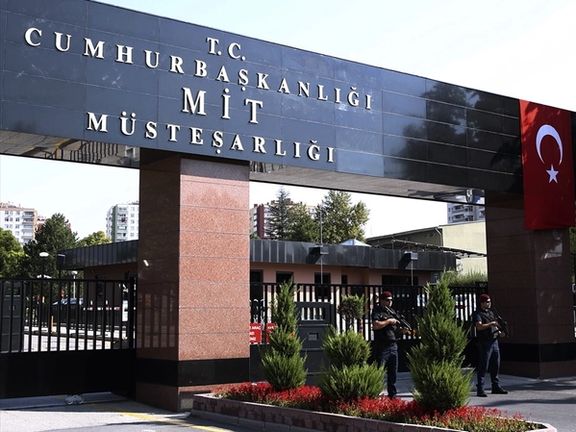
Turkish media reported Wednesday that the country’s intelligence had arrested 17 people allegedly linked to Iranian intelligence who were planning a kidnap.
OdaTV, the online news portal, broke the news with a figure of 11. TR Haber news website later said 17 had been detained in simultaneous operations on January 30. Turkish authorities have not made any official announcement, but have sweeping powers for detention under Turkey’s ‘anti-terrorism’ laws.
OdaTV alleged that the kidnappers included a Turkish state prosecutor, the owner of a defense company, a retired Turkish army colonel, and several non-commissioned officers. It claimed the target of the kidnappers was ‘Shah Nem,’ apparently an alias, who was wanted by Iran’s intelligence and lived in Zonguldak, a city in Turkey’s Black Sea region. The news portal alleged the ‘mastermind’ was Ali Ghahraman-Hajiabad, an Iranian intelligence agent who returned to Iran after organizing the team.
OdaTV also named an Iranian national, Morteza Soltan-Sanjali, as a “key link” in the operation and said he worked for By Saglam, a Turkish defense company, in Tuzla, Bosnia-Herzegovina.According to OdaTV, Soltan-Sanjali travelled to Zonguldak to find the intended victim, realized for some reason the operation had to be cancelled, and was then arrested by intelligence agents when attempting to reach Istanbul.
Soltan-Sanjali had supposedly recruited the kidnappers from retired Turkish and non-commissioned officers. Davut Yilmaz, who worked at the Kartal Anatolian Courthouse, was to use his judicial connections if anything went wrong.
Amid its growing use of extra-judicial powers in the face of criticism from rights groups and the European Union, Turkey has arrested dozens of Iranian and Turkish nationals in the past few years over alleged plots to kidnap or assassinate Iranian dissidents.
In 2021, Turkey released Mohammad Reza Naserzadeh, whom its intelligence agents had arrested in connection with the killing of Masoud Molavi-Vardanjani, a former Iranian defense official, in Istanbul in 2019.Turkey’s Daily Sabah had alleged that Naserzadeh, whom it said was a diplomat working in the consulate’s civic registry, had forged travel documents for Ali Esfanjani, the alleged ‘mastermind’ of the killing.
Iran's foreign ministry spokesman Saeed Khatibzadeh denied reports at the time of Naserzadeh’s arrest early in 2021 that he was an embassy employee, although Turkey's official Anadolou (Anatolia) news agency subsequently published footage of Naserzadeh's arrest at Istanbul airport showing his Iranian service passport.
Turkish government’s official TRT channel reported in 2020 that the its intelligence service MIT had unearthed a network tied to Iran’s intelligence ministry working to abduct or assassinate Iranian dissidents, and that the network had lured Farajollah Chaab, an Arab separatist leader, to Turkey, and then rendered him to Iran, where he is currently on trial.
This week, Turkish media also reported that 16 people including Palestinians and Syrian nationals arrested last October would be put on trial in Istanbul for "political and military" espionage for Israel, while a Danish court this week convicted three members of a Saudi-backed Arab separatist group committed to ‘terrorism’ in Iran.
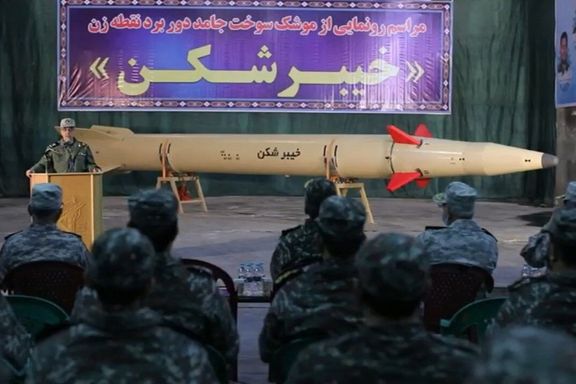
Pentagon says it is working hard to contribute to the self-defense needs of allies and partners to counter threats posed by Iran’s missile program.
Press secretary John F. Kirby said in a briefing on Wednesday that Pentagon is continually watching Iran and is keenly aware of the threats its ballistic missile program poses to the region.
Earlier on Wednesday, at the heels of the new round of nuclear negotiations in Vienna, the Revolutionary Guard (IRGC) unveiled a solid-fuel precision-guided ballistic missile with a range of 1,450 kilometers (900 miles), which puts US bases in the region and Israel within range.
Answering a question if the new missile -- dubbed Khaybar Shekan -- is a message to the US and Israel, Kirby said that the US doesn't look at this as a messaging issue, adding, “We see their malign activities as much more than messaging… they are malign activities on their own. They are destabilizing in the region. They're supporting terrorist groups across the region. They are harassing maritime shipping”.
He described it as “a legitimate national security threat issue in the region to our people, to our facilities, and to those of our allies and partners”, saying that “They are advancing a Ballistic Missile Program that is designed for offensive purposes to inflict harm and damage potentially lethal so on other states, other peoples”.
US lawmakers have asked President Joe Biden to focus on Iran’s missile program.